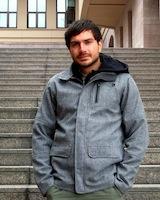
Inside the Citadel
Friday. A day for prayer. Two days before the national elections. Still warm and sunny.
A lieutenant from the US Army offers to escort me inside the compound of the Independent High Electoral Commission (IHEC). It is, supposedly, the most heavily-guarded building in Iraq right now, the high fortress of democracy, the central control room of the Iraqi parliamentary elections. I haven’t registered with the IHEC, so I doubt they will let me in but decide to try my luck anyway.
A man at the reception searches fruitlessly for my name in the list of accredited journalists. “Sorry,” he says. “You can’t go in.”
In the meantime, the lieutenant has gone inside to see if he can find anyone who can help me out. He comes back with a middle-aged woman in a black hijab. She introduces herself, shakes my hand, and immediately gets down to business. I don’t know what she is telling the receptionist, but her animated voice—first allegro then andante then adagio, full of coloraturas and arpeggios—seems to be working miracles on him. The stern features of his face soften, his eyebrows relax, the corners of his mouth begin to quiver, and soon he is laughing out loud. “Give me your ID,” he says, and I oblige. Before long, I’m walking towards the checkered white-and-blue entrance of the IHEC with a visitor’s badge in my hand. A cursory pat down and I am inside the citadel.
Hundreds of computers buzz everywhere. There are probably more computers and scanners here than in the rest of the country combined. Several flat-screen TVs, mounted high up on a wall, display blue Windows XP password screens. If the Iraqi elections crash, I hope Bill Gates is ready to take responsibility for the future of this country.
I walk around the building undisturbed. I go up the stairs, to the second floor, where rows upon rows of brand new filing cabinets will soon house all the paper ballots. I try one of the cabinets and it slides open. If I had a few ballots on me, I could have easily slipped them inside and nobody would have noticed. But don’t worry: if the results of the Iraqi elections are disputed, you can’t blame me.
Dimiter Kenarov is in Baghdad with a grant from the Pulitzer Center on Crisis Reporting. Learn more about this project on the Pulitzer website.

